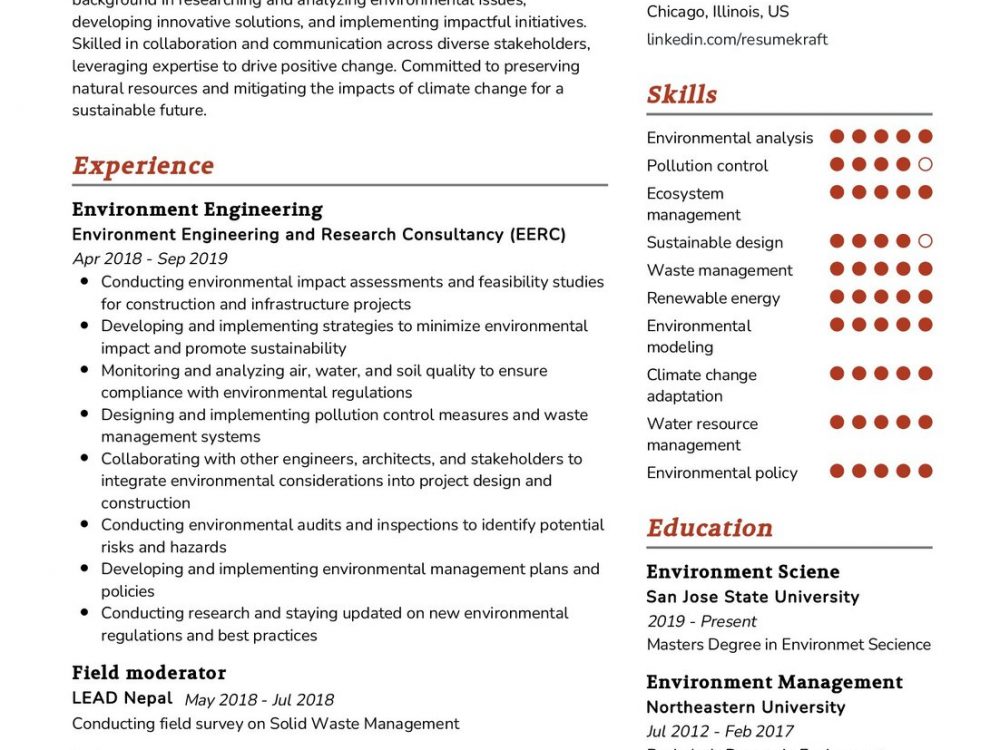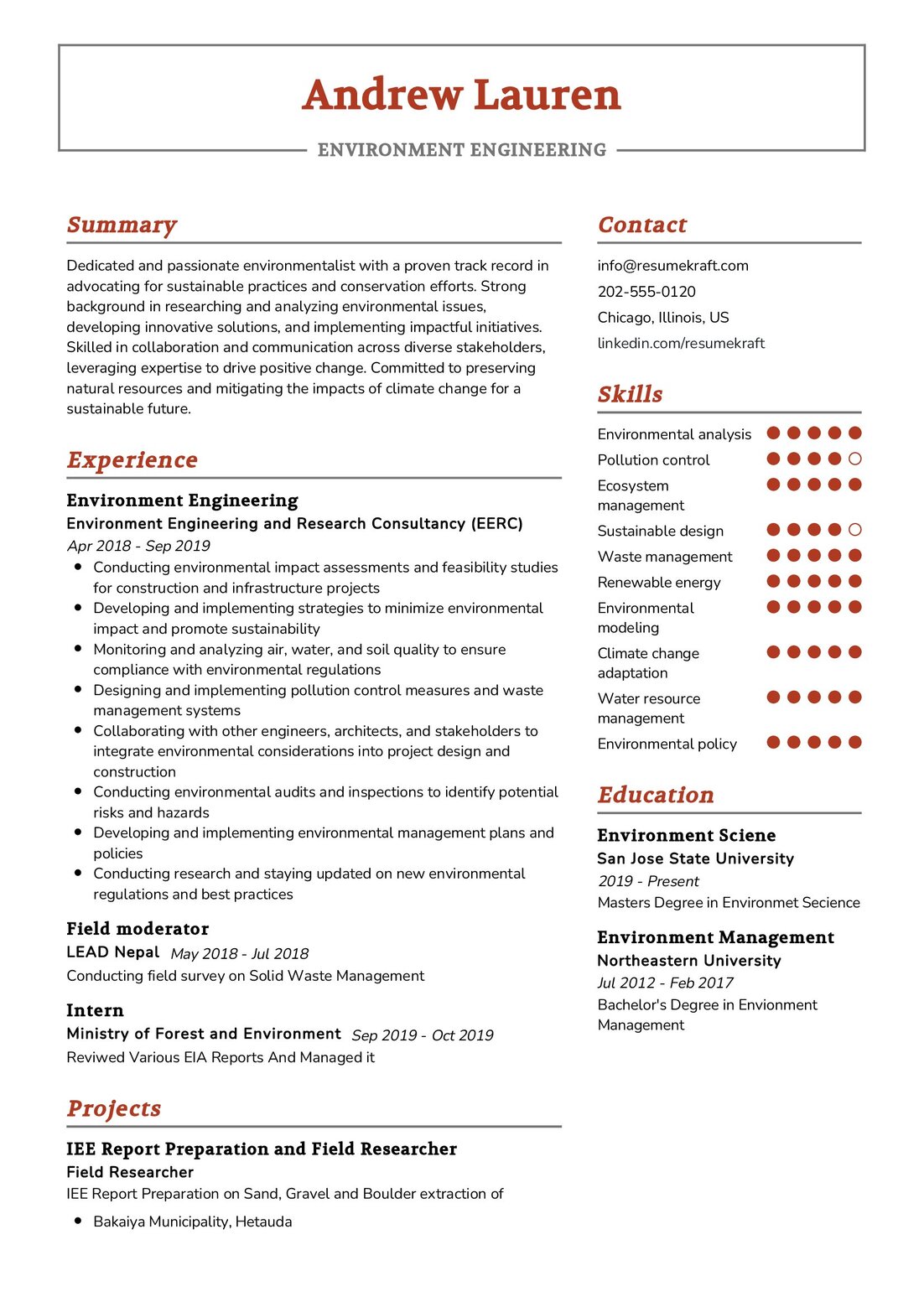Exploring the Role of an Environmental Engineer
The field of environmental engineering is gaining increasing importance in today’s world as societies recognize the crucial role of sustainable practices. Environmental Engineers play a pivotal role in addressing environmental challenges, applying engineering principles to develop solutions that promote ecological well-being. In this article, we’ll delve into the multifaceted role of an Environmental Engineer, the essential job requirements, key responsibilities, and tips on creating a compelling resume for this specialized position.
What is the Role of an Environmental Engineer?
Environmental Engineers are at the forefront of creating sustainable solutions to address environmental issues. Their role involves applying engineering principles to develop projects and initiatives that minimize the impact on the environment. Let’s explore the key aspects of an Environmental Engineer’s role, a position that demands a deep understanding of environmental science and engineering.
An Environmental Engineer is responsible for:
- Designing and implementing projects to prevent, control, or remediate environmental hazards.
- Conducting environmental impact assessments to evaluate the potential effects of proposed projects on the environment.
- Collaborating with multidisciplinary teams to develop sustainable solutions for waste management, pollution control, and resource conservation.
- Ensuring compliance with environmental regulations and standards.
- Advising on environmental policies and strategies for sustainable development.
- Conducting research to develop new technologies and methodologies for environmental protection.
The Environmental Engineer’s role is dynamic, requiring a blend of technical expertise and a commitment to creating a healthier planet.
What are the Environmental Engineer Job Requirements?
Becoming an Environmental Engineer involves meeting specific educational and professional requirements. Let’s explore the prerequisites that one needs to fulfill to embrace the role of an Environmental Engineer:
- A Bachelor’s or Master’s degree in Environmental Engineering, Civil Engineering, or a related field.
- Proficiency in environmental modeling software and other relevant tools.
- Understanding of environmental regulations and standards.
- Strong analytical and problem-solving skills to address complex environmental issues.
- Excellent communication skills to convey technical information to non-technical stakeholders.
- Experience in conducting environmental impact assessments and risk assessments.
- Familiarity with sustainable design principles and green technologies.
Attending workshops and gaining certifications in environmental management can enhance your profile and demonstrate your commitment to professional development.
What are the Responsibilities of an Environmental Engineer?
The role of an Environmental Engineer is diverse, involving a range of responsibilities aimed at promoting environmental sustainability. Let’s delve into the key responsibilities that define this role:
- Assessing the environmental impact of proposed projects and providing recommendations for mitigation.
- Designing and implementing systems for water and air pollution control.
- Developing strategies for waste management and recycling.
- Collaborating with government agencies, businesses, and communities to address environmental challenges.
- Conducting research to identify innovative solutions for environmental issues.
- Providing expert advice on sustainable practices and environmental regulations.
- Monitoring and evaluating the effectiveness of environmental programs and initiatives.
Each responsibility contributes to the overarching goal of creating a sustainable and ecologically conscious environment.
Environmental Engineer Resume Writing Tips
Crafting a compelling resume is crucial for standing out in the competitive job market. Here are some tips to help you create a resume that effectively showcases your skills and experiences as an Environmental Engineer:
- Highlight your educational background and any relevant certifications in environmental engineering.
- Showcase specific projects you have worked on, detailing your contributions and the impact of your work.
- Quantify your achievements, using metrics to demonstrate the success of your environmental initiatives.
- Include keywords related to environmental engineering to enhance the visibility of your resume in applicant tracking systems (ATS).
- Tailor your resume for each application, emphasizing the skills and experiences most relevant to the specific job.
Your resume is a powerful tool to communicate your expertise and passion for environmental engineering to potential employers.
Environmental Engineer Resume Summary Examples
Your resume summary serves as an introduction to your professional journey. Here are some examples tailored for Environmental Engineers:
- “Environmental Engineer with a Master’s degree in Environmental Engineering, specializing in sustainable waste management solutions. Proven track record in designing and implementing projects that meet and exceed environmental standards.”
- “Dedicated Environmental Engineer with extensive experience in conducting environmental impact assessments and developing strategies for pollution control. Adept at collaborating with diverse stakeholders to achieve sustainable outcomes.”
- “Results-driven Environmental Engineer with a passion for implementing green technologies and promoting sustainable practices. Skilled in designing and overseeing projects that prioritize environmental conservation.”
Your resume summary should succinctly capture your expertise and enthusiasm for environmental engineering.
Create a Strong Experience Section for Your Environmental Engineer Resume
Your experience section is the core of your resume, providing a detailed account of your professional journey. Here are examples to guide you:
- “Led a team in the development of a water pollution control system, resulting in a 30% reduction in pollutants discharged into local water bodies.”
- “Collaborated with regulatory agencies to ensure compliance with environmental standards, successfully obtaining permits for a major construction project.”
- “Initiated and managed a community-based recycling program, increasing the recycling rate by 25% in the first year.”
Each experience should highlight your contributions and showcase your ability to address environmental challenges effectively.
Sample Education Section for Your Environmental Engineer Resume
Your educational background is a critical aspect of your resume. Here’s how you can showcase your academic achievements:
- Master of Science in Environmental Engineering, XYZ University, a comprehensive program emphasizing sustainable practices, 2018.
- Bachelor of Science in Civil Engineering, ABC University, providing a solid foundation in engineering principles, 2014.
- Certified Environmental Professional (CEP), showcasing a commitment to ongoing professional development, 2019.
Your education section should emphasize your qualifications and any relevant certifications that demonstrate your expertise in environmental engineering.
Environmental Engineer Skills for Your Resume
Your skill set is a vital component of your resume, demonstrating your ability to excel in the role of an Environmental Engineer. Let’s list down the essential skills for this position:
Soft Skills:
- Analytical thinking, the ability to assess complex environmental issues and develop effective solutions.
- Effective communication, conveying technical information to diverse audiences clearly.
- Team collaboration, working seamlessly with professionals from various disciplines.
- Problem-solving abilities, addressing environmental challenges with innovative solutions.
- Attention to detail, ensuring accuracy in environmental impact assessments and project implementation.
Hard Skills:
- Proficiency in environmental modeling software, utilizing technology to assess and address environmental concerns.
- Knowledge of environmental regulations, ensuring projects align with legal standards.
- Experience in conducting environmental impact assessments, evaluating potential effects on ecosystems.
- Sustainable design principles, integrating eco-friendly practices into engineering projects.
- Project management, overseeing environmental initiatives from planning to completion.
Each skill is a valuable asset, contributing to your ability to excel as an Environmental Engineer.
Most Common Mistakes to Avoid When Writing an Environmental Engineer Resume
As you craft your resume, it’s essential to avoid common pitfalls that can diminish its impact. Here are some mistakes to steer clear of:
- Avoid using generic terms; instead, use specific keywords relevant to environmental engineering to enhance ATS visibility.
- Don’t overlook the importance of quantifying your achievements, providing concrete evidence of your impact in previous roles.
- Ensure your resume is tailored for each application, emphasizing the skills and experiences most relevant to the specific job.
- Avoid dense technical jargon; aim for clarity to make your resume accessible to a broad audience.
- Proofread thoroughly to eliminate any errors, presenting a polished and professional document.
Avoiding these common mistakes will help ensure that your resume effectively communicates your qualifications and experiences as an Environmental Engineer.
Key Takeaways for Your Environmental Engineer Resume
As we conclude this comprehensive guide, let’s recap the key points to keep in mind while crafting your Environmental Engineer resume:
- Emphasize your educational background and any relevant certifications in environmental engineering.
- Showcase specific projects and achievements to demonstrate the impact of your work.
- Quantify your achievements, using metrics to provide concrete evidence of your success in previous roles.
- Include keywords related to environmental engineering to enhance ATS visibility.
Finally, feel free to utilize resources like AI Resume Builder, Resume Design, Resume Samples, Resume Examples, Resume Skills, Resume Help, Resume Synonyms, and Job Responsibilities to create a standout application and prepare for the Environmental Engineer job interview.
Armed with these insights and tips, you are now ready to craft a resume that effectively showcases your expertise as an Environmental Engineer. Best of luck!


